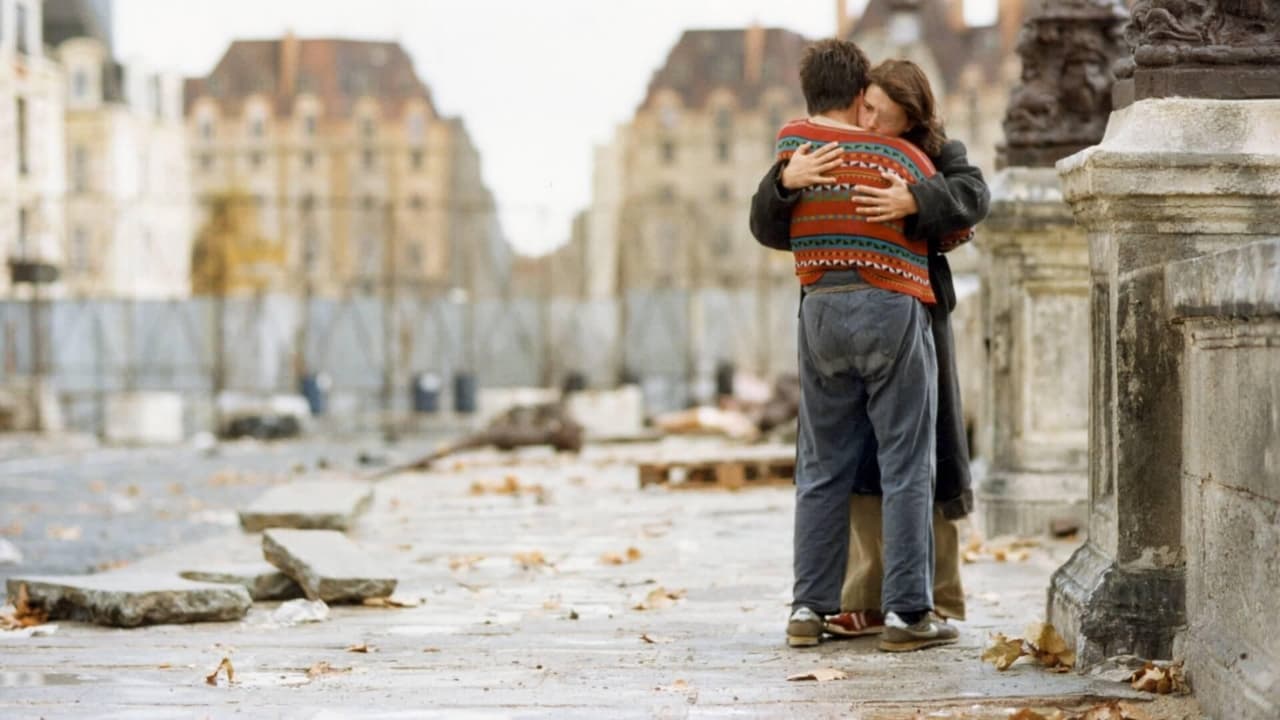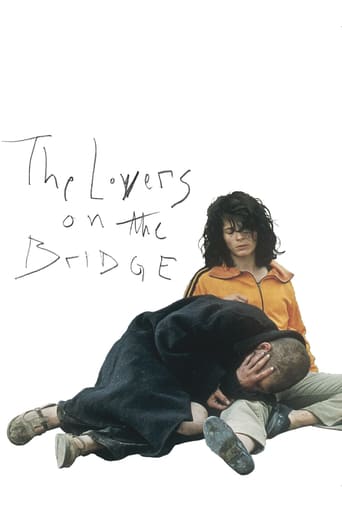

Reading up about the Cinéma du Look movement,I found out that along with Luc Besson and Jean-Jacques Beineix there was a third director,whose name I had not previously connected to Look. Taking a look at Leos Carax's credits,I discovered that one of Carax's titles was the most expensive French film ever made! (at the time) Which led to me getting ready to join the lovers on the bridge.The plot:Using what little cash he makes as a street performer on booze and drugs,Alex lives homeless on the Pont Neuf with old timer vagrant Hans.One day on the bridge,Alex discovers a new person sleeping rough.Going to meet the new stranger,Alex finds out that the new person on the bridge is Michèle,an artist who is going blind. Swept up in the energy surrounding the bridge,Alex and Michèle soon fall for each other.Becoming dangerously obsessed with Michèle,Alex starts to think of ways to make Michèle his own prisoner on the bridge.View on the film:Handling the biggest budget for a an offering from the movement,writer/director Leos Carax & cinematographer Jean-Yves Escoffier conjure up moments of pure Cinéma du Look magic blazing the sky and water in pulp colours as ultra-stylised tracking shots fully display the remarkable set.Focusing on the "alienated youth" of Cinéma du Look, Carax gives the tittle brittle edges which open up youth hostels and also whips up the frenzied romance between Michèle and Alex in decadent whip-pans and razor sharp editing giving the movie an excellent,raw animated atmosphere.Spending most of the film on the bridge,the screenplay by Carax casts a vast odyssey over Alex and Michèle relationship-a relationship which Carax subtly designs to complement each of their flaws,from Michèle gaining full sight at herself and the paintings,to Alex finding an inability to compromise his stay on the bridge.Spanning a period of over 3 years,Carax captures the psychological power play between Michèle (played by a stunningly tough edged Juliette Binoche) and Alex, (played with a real Punk attitude by Denis Lavant)but struggles to build a sense on the passage of time giving a depth to the relationship, due to Caraz threading the romance in an uneven, disjointed manner,as the lovers meet on the Cinéma du Look bridge.
... View MoreWow! This certainly wasn't like anything I expected. I thought I'd get an earlier version of "Chocolat" but ended up with the French answer to "The Deer Hunter".This movie certainly isn't entertaining, light, fun or frothy. It's like expecting a latte macchiato and being served elephant laxative. Paris is like a postnuclear wasteland here. Two young beggars meet when they camp out on Pont Neuf, Paris' eldest and most central bridge. Although the movie is surreal and fantastic over large parts (we will later see them waterskiing on the Seine during a fireworks display), this is maybe the most realistic depiction of psychotic people living on the streets I've ever seen.We go with Alex and Michèle through their love-hate relationship. It's amazing how unattractive Juliette Binoche looks here. Although you have to marvel about the twists and turns of the story and the many creative ideas of the director, in large parts it felt if someone tried too hard to impress me with their story. "There's this girl, she's super pretty but nobody knows because she's super messed up. She's this super talented artist but she's going blind. Then she meets this boy. He's super messed up, but also super talented. They live on this bridge. It looks messed up but it's actually the prettiest bridge of Paris." And so forth.This is the work of a talented megalomaniac. Enjoy the ride.
... View MoreSeems like the streaming format can't do justice to this cult film's visual pyrotechnics (literally, in the case of the famous Bastille Day fireworks/waterskiing sequence(!)), but what really tipped the balance for us was the operatic silliness of the plot. At first it seems like Carax is trying for the kind of bittersweet fantasy about the Parisian underclass that Jean Renoir and René Clair were turning out in the 30s—updated with a "gritty" layer of realism that can be difficult to watch. We didn't much care for the way the script exploits pathology—blindness, depression, dissociation, addiction, pathological jealousy and all-around destructive craziness—as a substitute for character and emotion, which comes across as cynical and pretentious. The over-the-top plot contrivances may make for some effective individual scenes—Michèle fantasizes about hunting down an ex-lover and shooting him, Alex destroys all the "have you seen this girl?" posters that Michèle's parents have put up, Michèle and Alex pose like figureheads on the prow of a barge on the Seine (remind you of anything?)—but none of it seems to add up to much in the end. There's another scene where middle-aged tourists are roofied and robbed by the lovers at an outdoor café; we see them waking up, feeling dazed and abused no doubt. We identified.
... View MoreI can guarantee this is not for all tastes, since it is not for my taste. The opening ten minutes are intensely depressing and I found that they set the predominant mood. That in itself is no reason to downgrade this film, but trying to resolve the frequent fluctuations between brutal realism and unbelievable fantasy ultimately wore me out.Alex and Michele are homeless and camping out on the Pont-Neuf while it is under repair. Michele is going blind and Alex is an alcoholic with a drug problem on the side - certainly a setup that will challenge all but the persistent to bug out. We see rubble on the bridge, but never any indication of there being active renovation going on. This is in keeping with there being almost nobody on the streets of Paris, or in the subways. Maybe the intent of this population void is to focus our attention on the protagonists, but it lent an unreal air to the proceedings for me. And just when we are willing to cut the film some slack in this area we are brought back to harsh realities.Indeed there are some wonderfully filmed scenes like Michele water-skiing on the Seine at night with Alex manning a speed boat. But what is to be made of that? Prior to this scene we see that Michele is weak and hardly able to walk. Most scenes overstay their welcome. When Michele takes to drugging the drinks of restaurant customers in order to put them to sleep so she can pick their pockets we are saturated with scenes of about a dozen people as they *slowly* succumb to the drug. And is that mode of theft really practical? And so on.What are we to take away from this film? That homeless people desire love and acceptance just like anybody else? That the homeless have their reasons for being as they are? That love can exist among the ruins? That a few dazzling scenes will keep people watching? That Juliette Binoche fans will put up with a lot just to see her in a movie? There were no new insights for me here.
... View More